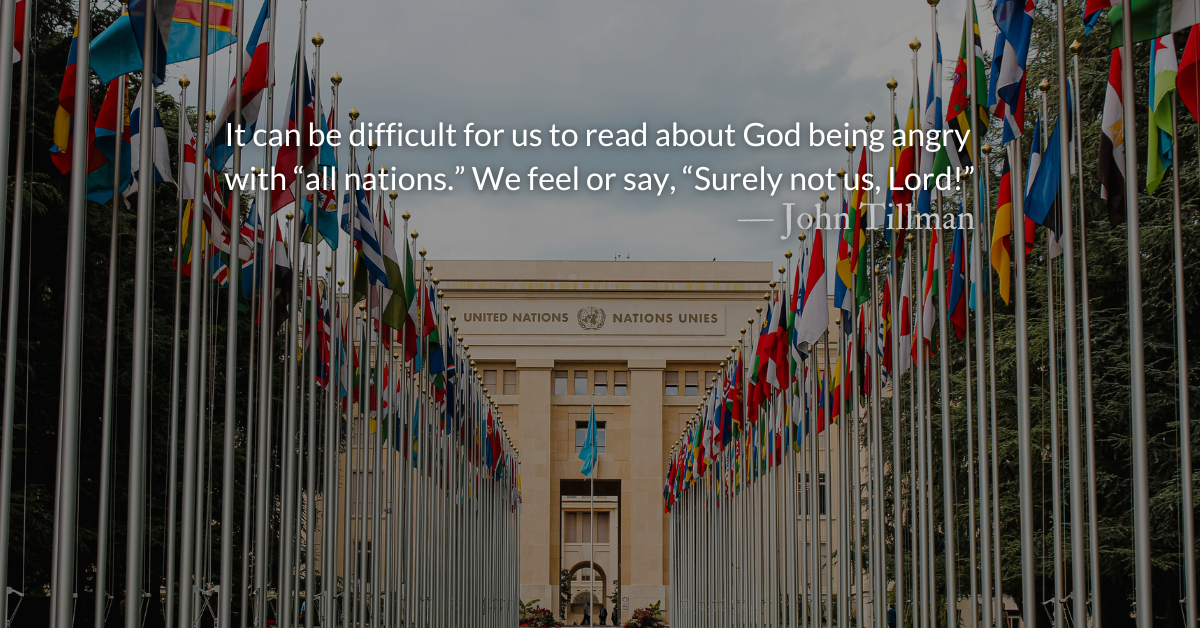Scripture Focus: Isaiah 34.1-2
1 Come near, you nations, and listen;
pay attention, you peoples!
Let the earth hear, and all that is in it,
the world, and all that comes out of it!
2 The Lord is angry with all nations;
his wrath is on all their armies.
He will totally destroy them,
he will give them over to slaughter.
Mark 14.27, 29
27 “You will all fall away,” Jesus told them…
29 Peter declared, “Even if all fall away, I will not.”
Reflection: Healthy Patriotism
By John Tillman
It is all nations, not some, that the Lord is angry with in Isaiah’s prophecy.
Why is God even mad at these nations? They didn’t have the commandments, the covenant, the Temple… What does God expect of them? And what does God expect of us?
Israel did enjoy a special relationship with God, with special privileges and responsibilities. However, God desires, even demands, all nations to worship him, not just Israel. (Acts 17.26-31) Israel was to be like a priest before the congregants—a guide and model. God is angry with all nations because all nations, even Israel and Judah, became rebels and traitors.
Especially around times of patriotic celebration, it can be difficult for us to read about God being angry with “all nations.” We feel or say, “Surely not us, Lord!” We must sound to God a bit like the disciples when Jesus said they would fall away. “Not me, Lord!”
The gospel writers, Mark and Matthew, show two moments in which Jesus confronted them with predictions of betrayal. (Mark 14.18-21, 27-31; Matthew 26.20-25, 31-35) One is direct betrayal to the authorities. All of them say, “Surely not me, Lord,” and only one of them, Judas, is guilty. The other is a more collective, or group betrayal, “You will all fall away.” Peter is the loudest objector but all the disciples deny the prediction. And all of the disciples, including Mark and Matthew were guilty. Mark, most commenters agree, is the young man who not only fled, but fled naked when he was grasped by his clothing. (Mark 14.52)
It is a grave theological error to mistake our own nation, wherever we live, for “God’s nation.” No modern nation is the spiritual inheritor of Israel and even if it were, that nation could and would fall. The Bible tells us that Israel became as evil as Egypt, Assyria, or Babylon. History tells us that believing one’s nation is “God’s nation” consistently leads, time and time again, to political atrocities in the name of God.
There is nothing sinful about patriotically celebrating what is good. There is, however, spiritual danger in denying national sins and glorifying national leaders. Eventually we’ll be asked to bow to their statues or demands. Directly or indirectly, we can betray Christ for patriotism.
Rarely are nations totally evil or good. Most are a mixture. Healthy patriotism, like healthy Christianity, celebrates good while lamenting and resisting evil.
Divine Hours Prayer: The Refrain for the Morning Lessons
“Because the needy are oppressed, and the poor cry out in misery, I will rise up,” says the Lord, “And give them the help they long for.” — Psalm 12.5
Today’s Readings
Isaiah 34 (Listen -2:59)
Luke 16 (Listen -4:27)
Read more about Celebrating Earthly Kingdoms|
Celebrating the country in which one lives is not un-biblical but it can be a dangerous, idolatrous trap.
Read more about Jeremiah, the Unpatriotic Prophet
Jeremiah’s refusal to embrace a politically expedient alliance with Egypt, gained him the hatred of ‘patriotic’ Israelites.








